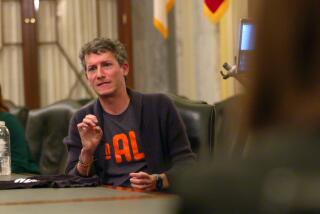‘Augie’s Quest’ a moving story, despite writing
- Share via
You may not know the name Augie Nieto, but in the gym world, he’s a rock star. In the late 1970s, when Nieto was still an impoverished college student, he opened his own gym in Southern California, launched his career as an entrepreneur and slowly built an exercise equipment empire that anticipated America’s cardio fitness craze. (It’s largely thanks to him that there are Lifecycles, computerized stationary bikes, in nearly every health club in the country.) His company became the largest commercial fitness equipment provider in the world.
That rags-to-riches story alone would result in a compelling memoir. But as it turns out, in his book “Augie’s Quest,” Nieto has a different story to tell. A former couch potato transformed into a weightlifter, marathoner and fitness fiend, the charmed, handsome CEO found himself in an unusually vulnerable position just a few years ago, at age 47, when he experienced mysterious, prolonged physical pains. In March 2005, he was diagnosed with ALS -- amyotrophic lateral sclerosis, also known as Lou Gehrig’s disease. Initially, Nieto refused to accept his fate. But seven confirmations later from various institutions, Nieto and his wife, Lynne, who live in Corona del Mar, braced themselves for the battle ahead. Survival rates for ALS are typically three to five years after diagnosis. No cure exists.
“Augie’s Quest,” co-written by T.R. Pearson, is Nieto’s attempt to change that. It isn’t surprising that the book’s introduction is by Mitch Albom, whose bestselling “Tuesdays With Morrie” brought awareness of ALS to millions of readers (not to mention the Oprah Winfrey-produced TV version of the story). Yet this disease remains unknown to many people and is relatively neglected in the medical research community. The authors cite $42 million in grant money earmarked for ALS studies this year, compared with $1 billion for Alzheimer’s and $4.6 billion for cancer.
It is a terrible irony that Nieto, a physically powerful man who devoted his life to fitness, now suffers from a disease that destroys the nerves controlling his muscles, ultimately causing complete paralysis while leaving mental functioning intact. The facts of his story are undeniably poignant. Shortly after his diagnosis, Nieto suffered from depression and attempted suicide. Now he oversees the Muscular Dystrophy Assn.’s ALS division and has become a crusader for funding innovative research worldwide.
But it doesn’t serve Nieto well that his book is poorly written: His “unofficial spiritual adviser,” for instance, is described as giving off “an air of serenity as if it were cologne.” The story is told in third-person (“Augie lost consciousness briefly, but he soon came around . . . “), even though Nieto is credited as its primary author -- an odd choice that proves emotionally distancing for the reader. And the book’s structure flits from personal history to ALS history to various anecdotes and back again, with italicized mini-narratives tossed in from Nieto, his wife and a friend or two.
In spite of itself, “Augie’s Quest” tells a deeply moving story -- particularly in the passages in which Nieto’s and his wife’s voices are directly heard. In one chilling moment, Augie recalls how “[t]wo weeks ago, we had a knock at the front door. Claudia, our housekeeper, answered it. It was a realtor, and he asked her if the house was for sale. He told her he’d heard the owner had died.”
The hard facts mentioned about this disease are also compelling. Because ALS is so rare, “pharmaceutical companies can’t be bothered to invest their considerable research dollars in a disease that affects only five to seven thousand Americans annually,” the authors note. But Nieto insists there’s a huge profit margin available to these companies, based on what they could charge for ALS medications. The 1982 Orphan Drug Act states that for drugs used to treat diseases affecting fewer than 200,000 Americans annually, there is no pricing limit. As a savvy businessman, Nieto believes pharmaceutical companies are ignoring a great opportunity.
Nieto will turn 50 in February. For him and for thousands of others, changing how this disease is researched and funded is urgent. Long-term academic studies cannot save lives soon enough. At this point, not only is there no cure for ALS but no way to slow its progress. And one day of clinical research costs about $30,000, meaning that even a $1 million donation will be burned through quickly.
Drugs on the market can only control side effects and treat depression. In advanced stages of the disease, “ALS locks in its victims, and they’re helpless to do anything but think.” Voluntary muscles cease to function, which led one prominent neurologist to refer to this stage of ALS as “the human mind in solo flight.”
Over the last few years, Nieto has branded himself as the face of ALS; and, much like Michael J. Fox, who has Parkinson’s disease, Nieto is tirelessly fundraising and pushing for aggressive, creative, cure-driven research. No one should (or will) pick up “Augie’s Quest” for its prose -- but the story it tells, clunky as it may be, is undeniably inspiring and sad.
Carmela Ciuraru is the editor of six anthologies of poetry, including “Beat Poets.”
More to Read
Sign up for our Book Club newsletter
Get the latest news, events and more from the Los Angeles Times Book Club, and help us get L.A. reading and talking.
You may occasionally receive promotional content from the Los Angeles Times.







